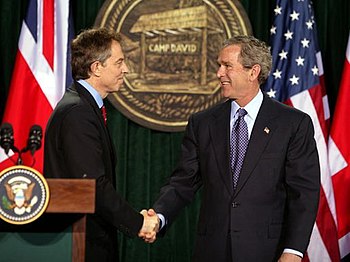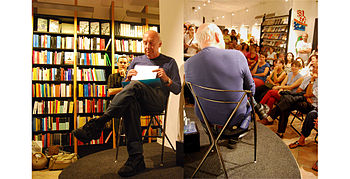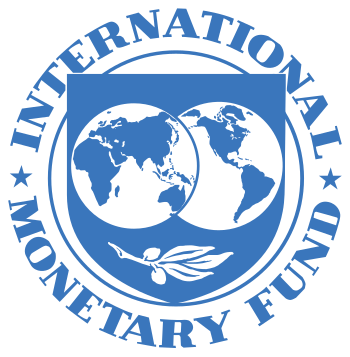| EU borders in Europe (Photo credit: Wikipedia) |
| Two lying leaders: ExPrime Minister of the United Kingdom, Tony Blair shaking hands with President of the United States, George W. Bush. (Photo credit: Wikipedia) |
I have a new candidate as No. 1 on my list of unbelievable
headlines: it occurs in today’s edition of The
Guardian newspaper, and it says:
Most migrants crossing Mediterranean will be sent back, EU leaders to
agree
In the first paragraph of the following story, things
become even more unbelievable
“Only
5,000 resettlement places across Europe are to be
offered to refugees under the emergency summit crisis package to be agreed by
EU leaders in Brussels on Thursday.”
Is this some kind of a joke? I have
been expecting this story about the hordes clamouring at the gates of the
richer countries ever since, in a book published in 1972 or thereabouts, I
wrote that in a world in which the citizens of the world’s dirt-poor countries
could see and understand that other countries were wallowing in the world’s
riches, it could be expected that eventually hordes of those from the poorer
countries would be beating the doors down, as they cry furiously, “We want some
of that! We, too, would like to have electricity, running water, decent houses,
clean water to drink, education for our children, everything that is available
here and now, but only you over there have access to it.”
Well, okay, maybe I didn’t write
exactly those words, but they were to be implied by what I did write.
This effort to beat down the
doors of Europe has been going on for some years now, to such an extent that a
whole camp for the would-be door-batterers has been established (and
repeatedly, but vainly closed) in Calais to house temporarily people from all
over Africa and the Middle East and even from the poorer countries in east Europe,
who hope somehow to stow away on trucks
crossing the channel to Britain, there to be accepted as refugees and granted
the possibility of staying permanently and becoming citizens.
Also, at the other end of Europe,
the island of Lampadusa has become a regular feature in our news columns as its
residents have had to welcome thousands of refugees rescued from the perilous
boats in which they have hoped to make the crossing from Africa, once again in
the hope of being moved on to Germany or some other welcoming European country
for permanent settlement.
All this has been exacerbated by the
breakdown in order in the Middle East (again, something the West is guilty of
initiating with its unprovoked invasion of Iraq in 2003, when, to quote myself once
again, I wrote that this invasion would destabilize the entire region, and
wondered why, if I could understand that, the powers-that-be in the western
aggressor countries could not)), resulting in the vast numbers of refugees
pouring out of Syria as they try to escape the destruction of that country by the
forces of both government and revolutionary insurgents. Similarly, the chaos that
has followed the bombing of Libya by European forces has generated such a
breakdown of effective government that it has become the favoured takeoff point
for thousands of refugees, being carried by people-smugglers in the hope of making
it across the Mediterranean. In recent weeks, while many have made it, many
hundreds, even thousands, have drowned:
in a week in which more than 10,000 people have made it to Lampedusa or Sicily
or Malta, boats carrying, in the first instance, more than 400 people have
capsized, and in the second instance more than 900, and there is a report of
another of 200, the survivors being numbered only in their tens or scores. This
is a vast calamity, approaching in numbers the death roll for the bombing of
the World Trade Centre in New York in 2001. But with less impact, on account of the victims here being poor and
desperate nobodies, and not the well-heeled functionaries of international
business firms, as happened in New York.
But surely a little more
perspective is required here. It is said that some 150,000 people have arrived on
the shores of Europe so far this year. That is not an especially large number.
If Canada, a country of 35 million people can absorb 250,000 migrants year after
year then it should not be beyond the capacity of the continent of Europe to
absorb this number, or, conceivably even, as many as are likely to be able to
make it, even though they are admittedly likely to be poor, poorly-educated for
the most part, and close to destitution on arrival. As the fellow said
somewhere or other, and it applies to Europe today, “Methinks he doth protest
too much.”
Last year, according to what I
heard the Italian Foreign Minister say today on TV, some 170,000 people made it
to Europe in this illegal, or desperate way. Of these Italy absorbed 150,000,
and other countries took the rest. Other figures indicate that of the millions
of refugees pouring out of Syria, Germany has taken 50,000, Sweden 30,000, and
--- wait for it! --- Britain, that traditional home for the refugee desperate from oppression, has
promised to take 143.
As a guy who comes from one of
those countries that have traditionally been the depositories for Europe’s poor
and desperate masses --- think of the
Italians, Poles, Swedes, Balts and Irish in the United States, the Germans,
Ukrainians, Russians, and others in Canada, the English and Scottish in New
Zealand, the masses of Yugoslavs, Hungarians, Italians in Australia, even the
Spanish and Portuguese in South America ---- I could be forgiven for thinking
it is no more than justice that these nations should now be asked to shelter
and nurture the poor and oppressed from other countries.
Some of he arguments made by European leaders have been ridiculous. When the Italians had a costly search
and rescue programme up and running, most people whose boats capsized were
saved, and taken to Lampadusa. The British government --- under
pressure from the Ukip party that opposes immigration --- has argued that such a
measure had the effect of encouraging continued illegal migration because it
took the danger out of it. The Italian Foreign Minister today quietly demolished
that reasoning: in practice, the attempts to cross had increased greatly once
they had cancelled their search and rescue programme.
Now these birdbrain politicians
appear to be flirting with the idea of some sort of military intervention that
would destroy the boats of the smugglers before they are used. Others, always
glad for a postponing mechanism, argue that the only solution is to dig deep
into the societies that produce these migrants by aid measures designed to
reduce poverty and improve living and working conditions. The Italian Foreign
Minister went so far as to mention, in passing, northern Nigeria and its
subjection to Boko Haram. If this is the
sort of solution they are flirting with, it can be prophesied that many
thousands more bodies will be despatched into the Mediterranean in the coming
years.
As for Britain, it is in the
midst of an election, and nothing sensible or humane can be expected to come
from any of their politicians.
When I made films in China in the
1970s one of the things that impressed me was how much they had succeeded in
doing by shutting right out of the country every influence from outside. It
could be, I suppose, that such measures are no longer possible; but I think it
can be said that it remains true that solutions to crises that are hitting so
many countries today can only, in the end, come from within these countries
themselves. It may be true that extremely useful work has been done in aid in
the past, but it is always on a measured low-key scale, and has proven
incapable of dealing with the overall poverty of nations.
As for the current emergency, it
certainly is time that Europe did some clearer thinking about immigration, put
its collective will together, and made sure that, faut de mieux, it took action to prevent the drownings, and then
worked to carefully distribute the people who have arrived on an equitable
basis around a continent that can well afford to absorb them into its work
force and citizenry.








